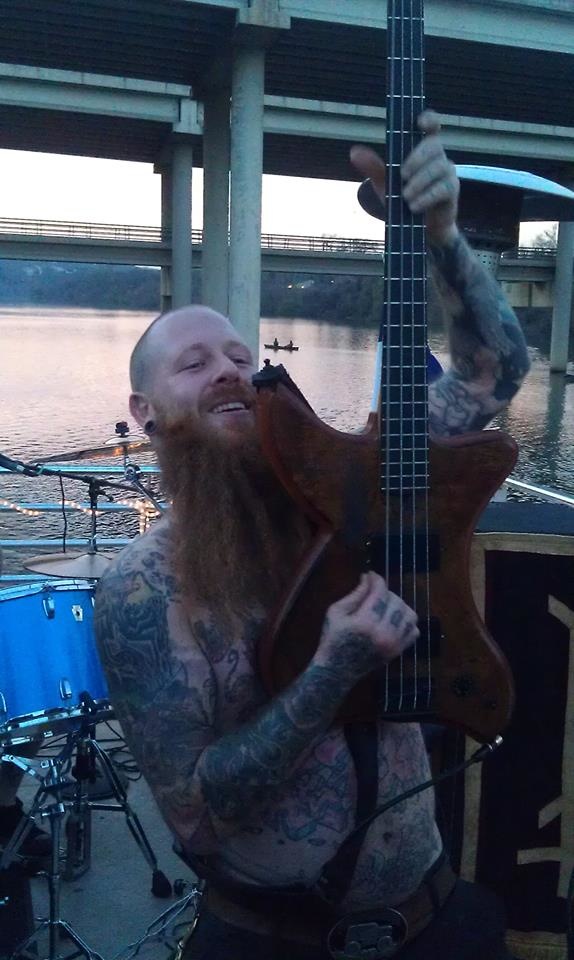Photo by Angela BoatwrightExactly one year and a day ago, I got the kind of phone call that shakes you to your core. One of my best friends was hurt bad, real bad; bad enough that the raspy, weary voice on the other end of the line advised me to buy my plane ticket down to Georgia to say goodbye. By the time I stepped out into the Savannah sun a couple of days later, he was gone. A man with whom I’d spent years of my life traveling, working, laughing, and mischief-making was dead, lost in a split-second flash of light and screeching tires. All those long nights spent sleeping on floors, the bickering, the whiskey shots, the heart-to-hearts, the hugs, and the chaos had come to a shuddering stop, and I felt my world crash down around me. Death had come far too early, and yet, it had come.The most surreal part of Athon’s passing was watching it snowball into something bigger. It was a tragedy on its own, but the fact that he is—was—in a heavy metal band added a strange kind of unexpected pathos to the proceedings. Because of his success with Black Tusk, his death became a news item, hastily reported upon by scores of music websites—many of whom showed compassion and respect, others of whom got his name wrong, and more than a few who had never bothered to write about his band while he was alive. Sympathetic comments poured in from people he’d never known and now never would. Fans chimed in, attesting to the impact his music and his presence had had on their own lives. We watched as his death became public property.As I mourned, his other friends and his family mourned too, all of us together and alone. His bandmates were hit especially hard, as they faced both the massive scope of their own grief and the daunting task of deciding on the future of the band that the three of them had poured their hearts into for so long. Black Tusk had a tour coming up—the biggest one of their career to date—and they knew that Athon would have whupped their asses if they’d turned it down. And so they carried on, and the rest of us carried on with them, and the pain never dulled, but it quieted. Athon would’ve hated to see us so torn up over him, and so we tried to smile through the tears. Photo by the authorThe sheer number of people who reacted to the news and paid tribute in their own ways was a testament to the impact he’d made with his life’s work, which was a beautiful thought to entertain. It was comforting to see the fan tributes, the photos posted to the band’s Facebook page, the heartfelt comments reminiscing on certain shows or beers shared backstage. At some points, though, it got uncomfortable. When people I hardly knew and who’d never met him insisted on coming up and trying to talk to me about him just for the sake of gossip, I seethed as salt coated my wounds. The time a stranger chased me down across multiple subway stops and halfway through Union Square to talk to me about the tattoo I’d gotten with Athon’s initials and say that he’d thought of getting one of his own left me unsettled, least of all because he’d never met Athon (and had, you know, stalked me halfway across Manhattan).It’s a very strange feeling watching strangers grieve over someone you love. When you become friends with someone in a successful band (or when one of your friends joins a successful band), the relationship changes ever so slightly; you’re both the same people, and your friendship is still a friendship, but now, you have to share them. If you’re hanging out at a show and a fan comes up asking for a photo, you’ve got to move your ass out of the way. If you’re bullshitting over a drink and someone comes up wanting to talk about your friend’s guitar rig or the brand of amplifiers they use, you’ve got to slide on over and wait for the conversation to run its course. That’s part of the deal.There is a debt of gratitude that a band owes its fans for their support, as much if not more than what a fan owes the band for their music; when musical legends or well-loved band members die, scores of fans stream in to repay that debt. We’ve seen it with Dio, with Dimebag, and with so many others. Seeing it happen to someone I know so well was jarring, but came as part and parcel of that earlier agreement. In death, as in life, I had to share Athon. but thankfully, with his big laugh and big beard and big heart, there’s always been more than enough to go around.
Photo by the authorThe sheer number of people who reacted to the news and paid tribute in their own ways was a testament to the impact he’d made with his life’s work, which was a beautiful thought to entertain. It was comforting to see the fan tributes, the photos posted to the band’s Facebook page, the heartfelt comments reminiscing on certain shows or beers shared backstage. At some points, though, it got uncomfortable. When people I hardly knew and who’d never met him insisted on coming up and trying to talk to me about him just for the sake of gossip, I seethed as salt coated my wounds. The time a stranger chased me down across multiple subway stops and halfway through Union Square to talk to me about the tattoo I’d gotten with Athon’s initials and say that he’d thought of getting one of his own left me unsettled, least of all because he’d never met Athon (and had, you know, stalked me halfway across Manhattan).It’s a very strange feeling watching strangers grieve over someone you love. When you become friends with someone in a successful band (or when one of your friends joins a successful band), the relationship changes ever so slightly; you’re both the same people, and your friendship is still a friendship, but now, you have to share them. If you’re hanging out at a show and a fan comes up asking for a photo, you’ve got to move your ass out of the way. If you’re bullshitting over a drink and someone comes up wanting to talk about your friend’s guitar rig or the brand of amplifiers they use, you’ve got to slide on over and wait for the conversation to run its course. That’s part of the deal.There is a debt of gratitude that a band owes its fans for their support, as much if not more than what a fan owes the band for their music; when musical legends or well-loved band members die, scores of fans stream in to repay that debt. We’ve seen it with Dio, with Dimebag, and with so many others. Seeing it happen to someone I know so well was jarring, but came as part and parcel of that earlier agreement. In death, as in life, I had to share Athon. but thankfully, with his big laugh and big beard and big heart, there’s always been more than enough to go around. Photo by the author
When I think of Athon, I don’t think about his bass tone or his tattoos. I think about the time we were on tour with a couple of our friends’ bands and had a day off at some hotel in the middle of nowhere. We spent all day splashing around the pool and chugging rum until it started to rain. As the rest of us ran shrieking back into the building, Athon crouched over a tiny portable grill, stubbornly coaxing it into life so that we could have a parking lot barbeque later. He was an amazing cook, and took pride in filling bellies—he even put up with my persnickety tastebuds as he whipped up culinary marvels for everyone else. I’ll never forget that night in the wild Virginia mountains when we gathered around the grill after a day spent fly-fishing and Walmart exploring to watch him carefully conjure up what he called “millionaire bacon”—’cause with its cayenne, brown sugar, and maple flavors, that shit tasted so good it made you feel like a million bucks. He made me some “boring” chicken, too, grumbling like only someone who loves you and thinks you’re missing out will grumble. That was one of the happiest days of my life, and it’s hard knowing that I’ll never get another one quite like it.Kim Kelly is TCBT on Twitter.
Photo by the author
When I think of Athon, I don’t think about his bass tone or his tattoos. I think about the time we were on tour with a couple of our friends’ bands and had a day off at some hotel in the middle of nowhere. We spent all day splashing around the pool and chugging rum until it started to rain. As the rest of us ran shrieking back into the building, Athon crouched over a tiny portable grill, stubbornly coaxing it into life so that we could have a parking lot barbeque later. He was an amazing cook, and took pride in filling bellies—he even put up with my persnickety tastebuds as he whipped up culinary marvels for everyone else. I’ll never forget that night in the wild Virginia mountains when we gathered around the grill after a day spent fly-fishing and Walmart exploring to watch him carefully conjure up what he called “millionaire bacon”—’cause with its cayenne, brown sugar, and maple flavors, that shit tasted so good it made you feel like a million bucks. He made me some “boring” chicken, too, grumbling like only someone who loves you and thinks you’re missing out will grumble. That was one of the happiest days of my life, and it’s hard knowing that I’ll never get another one quite like it.Kim Kelly is TCBT on Twitter.
Advertisement
Advertisement


